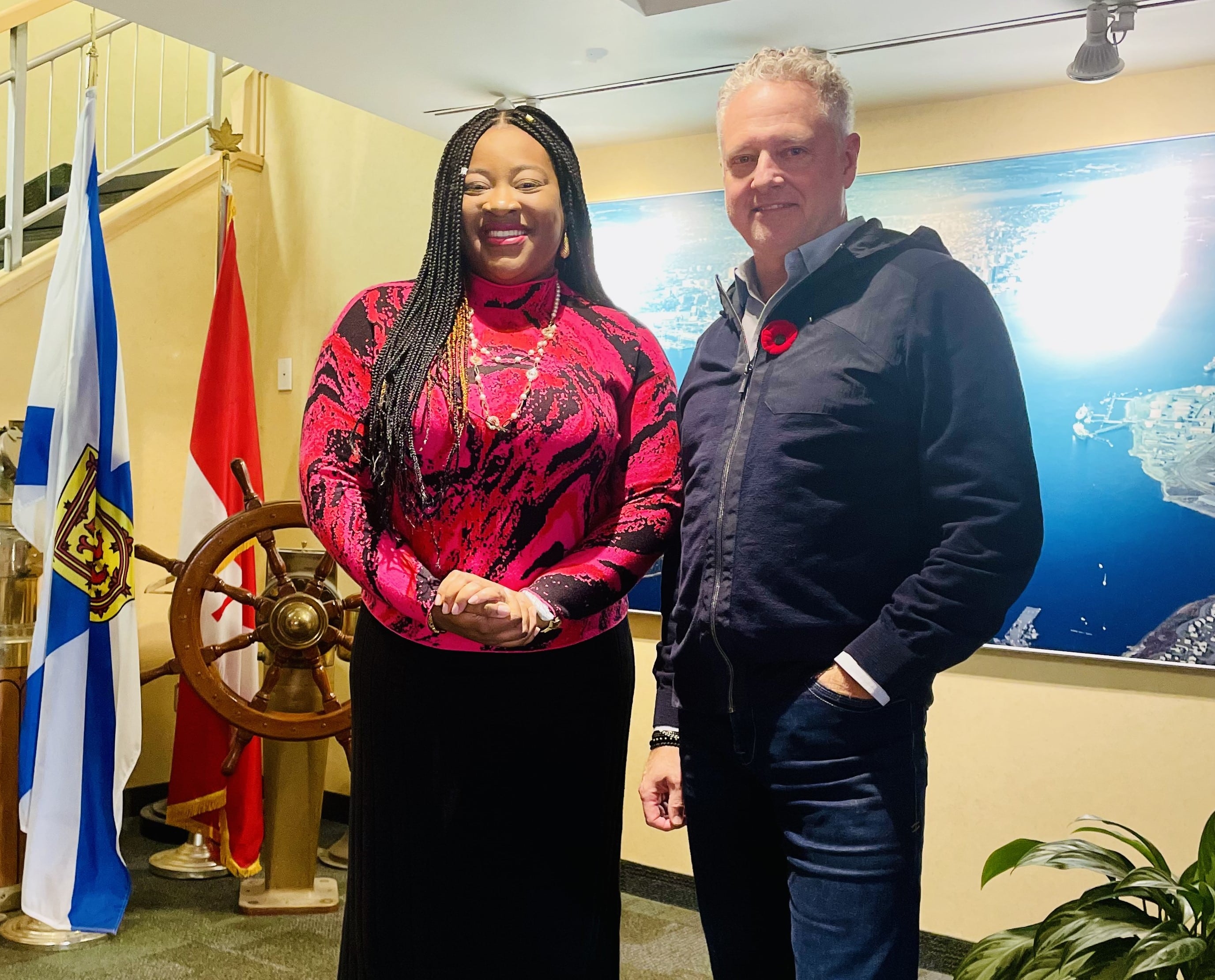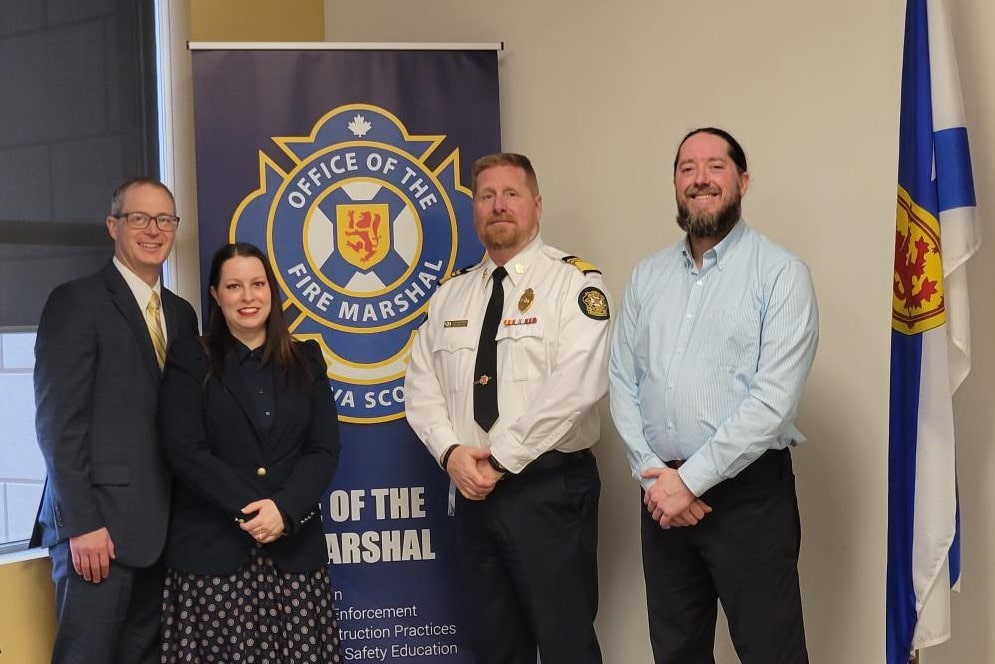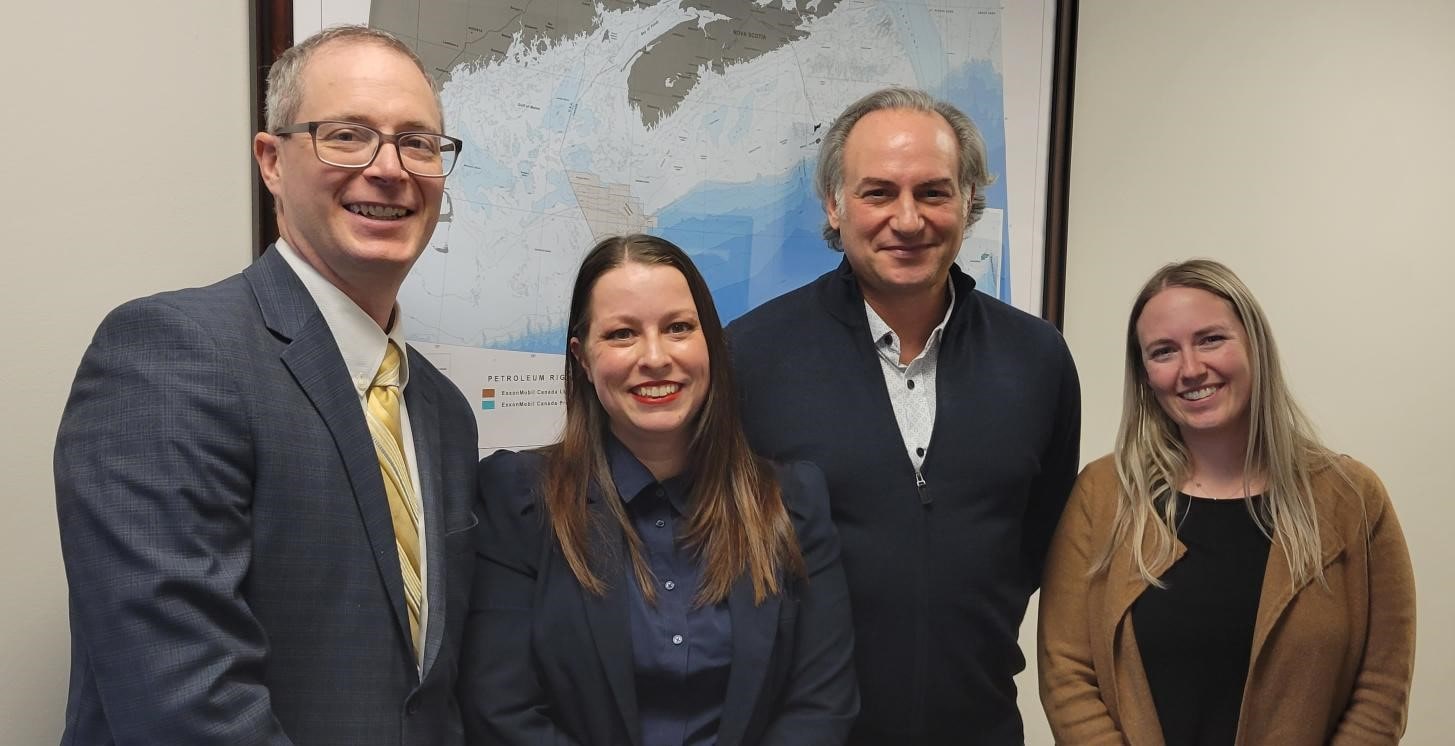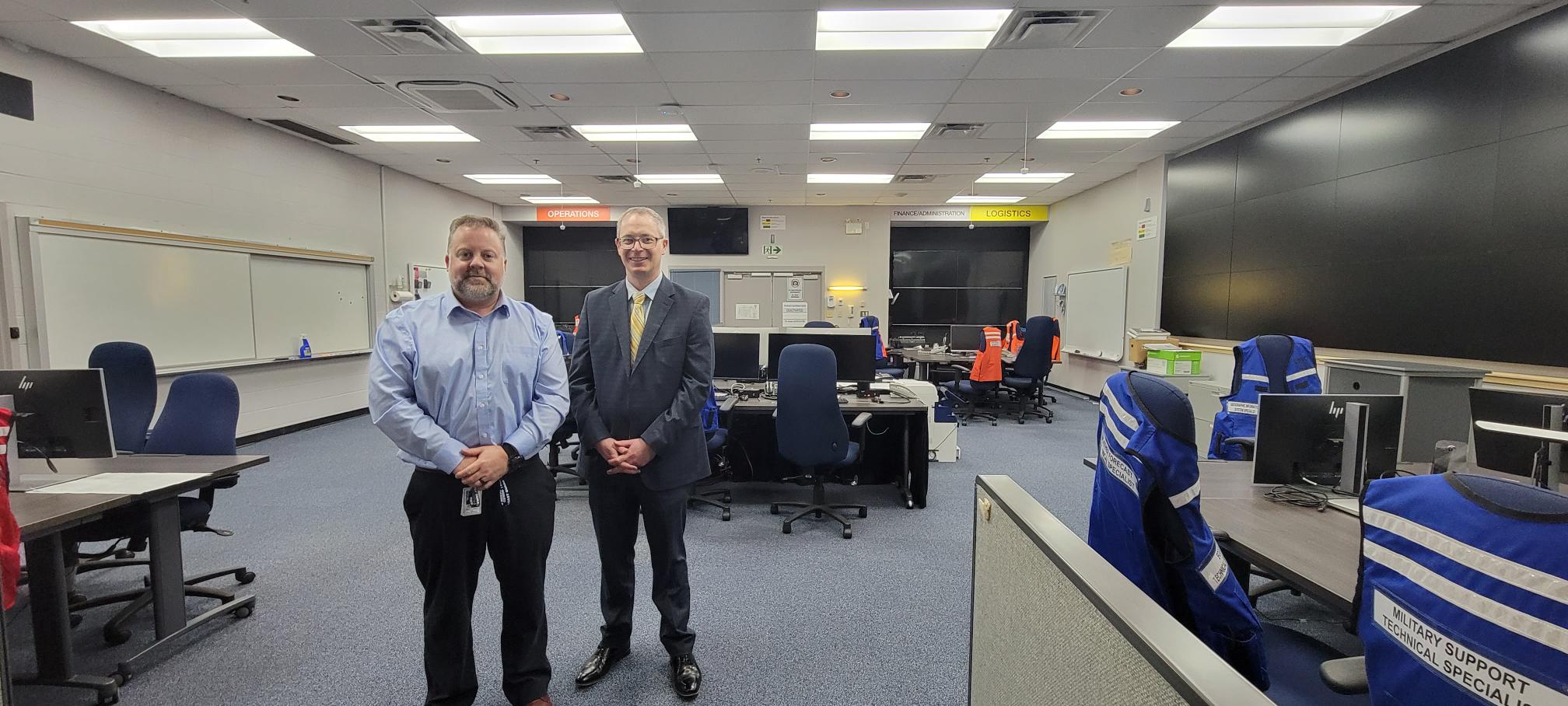November in Nova Scotia: Oil spill preparedness and awareness

Chiamaka Mọgọ, Deputy Administrator, Ship Fund with Captain (Ret’d) Mike Davie, Vice-President of Operations and Technology of the Port of Halifax and at the Sustainable Ocean Conference.
Millions of litres of oil are used or transported by ships and boats in Canada. Nova Scotian communities along waterways face the risk of oil spills from ships and boats every day. So, in November 2024, our team focused our outreach efforts on Nova Scotia with two important trips.
Did You Know?
- Only 10% of claims for oil spill damages were submitted to the Ship Fund for incidents in Nova Scotia, totaling $4M paid since 1989.
- Only one town in Nova Scotia has ever submitted a claim to the Ship Fund. The result: it received $44,000 in compensation.
Trip 1: Sustainable Oceans Conference and meeting with the Port of Halifax
Chiamaka Mọgọ, Deputy Administrator, Ship Fund, concluded a successful outreach trip to Nova Scotia in early November. During her visit, she participated in the Sustainable Ocean Conference. She engaged with a diverse group of ocean experts, including Indigenous leaders, conservation researchers, students, and fisheries professionals.
As part of her trip, Chiamaka also visited the Port of Halifax to meet with Captain (Ret’d) Mike Davie, Vice-President of Operations and Technology. Their discussion focused on the ways the Ship Fund can support ports, including its role in paying compensation for mystery spills and our new compensation handbook for ports, harbours, and marinas.
Trip 2: Nova Scotia Federation of Municipalities (NSFM) 2024 Annual Conference and outreach meetings in Halifax
Cameron Grant, Director and General Counsel, and Jannie Bédard Guillemette, Communications Manager, participated in the NSFM 2024 Conference. Over 60 community leaders visited our booth. Many told us they were unaware of the Ship Fund's existence. Some expressed concern that an oil spill in Nova Scotia is more a matter of a “when” than a "if”.
Many participants committed to informing their local leadership, fire departments, and emergency response teams, about the Ship Fund and the cost recovery options it provides.
Conversations That Spark Change: Engaging with Fire Services and local government on Oil Spill Response
Our meeting with the Office of the Fire Marshal and the Maritime Fire Chiefs Association brought to light the critical role firefighters often play in the initial deployment following a ship oil spill.
Firefighters are often first on the scene when a vessel spills oil or catches fire. They can be asked to stabilize the situation before other authorities, such as the Canadian Coast Guard, take over. These initial interventions can be crucial in preventing further damage or to monitor the situation.
However, we heard firsthand about the challenges these fire services face when it comes to recovering the costs of their interventions. Limited budgets often mean these costs are shouldered by their local government.
The good news is that these conversations have helped spread the word! Looking ahead, we’ll collaborate with the Nova Scotia Department of Municipal Affairs to promote the compensation the Ship Fund can provide and hope to see more claims submitted by those on the front lines of these incidents.
Our team with Doug MacKenzie, Fire Marshal for the Government of Nova Scotia and Nick Barr, Director of Governance & Advisory Services at the Nova Scotia Department of Municipal Affairs and Housing. Not on the photo: Jamie Young, Deputy Fire Marshal.
Our team with Vince Mackenzie, President of the Maritime Fire Chiefs Association. Not on the photo: Greg Jones, President of the Fire Service Association of Nova Scotia
Fisheries and Spill Preparedness: Supporting Coastal Communities
We were in Nova Scotia during “dumping day”, where over 1,450 lobster boats set sail off southern Nova Scotia, kicking off a new season in Canada’s lobster fishery that brings in hundreds of millions of dollars.
In this context, we met with the Fisheries and Integrated Resources Department of the Atlantic Policy Congress of First Nations Chiefs Secretariat. Their work supports the commercial communal fisheries operations of member communities, which yield an annual revenue of over $120 million and collaborate with communities and First Nations on fisheries issues. In the case of a spill, they would disseminate information to the affected communities.
Defining our relationship with other organizations
We had the opportunity to meet with the Canada-Nova Scotia Offshore Petroleum Board (CNSOPB) for the first time. This introductory meeting focused on understanding the legal intersections between their responsibilities and ours, especially in terms of compensation. We discussed the international regime governing oil spill liability and compensation, including international conventions and Canadian laws. While preliminary in nature, the discussion laid the groundwork for a future meeting, where specific scenarios could be explored in greater depth.
Our team meeting with Nichole Bush, Analyst, Regulatory Policy and Shanti Dogra, General Counsel and Director, Legal & Regulatory Affairs at the Canada-Nova Scotia Offshore Petroleum Board
A Behind-the-Scenes Look at Response Preparedness
Our meeting with the Nova Scotia Department of Emergency Management (DEM) provided valuable insights into their coordination role during an extensive range of emergencies, including a visit to the provincial Emergency Center. Our discussions highlighted the importance of collaboration, especially when an Incident Command System (ICS) is activated, between federal, provincial, and local authorities to respond to oil spill incident. For example, we highlighted the importance for each claimant to document their areas of responsibility and actions taken to support their claim submission to us.
Jason Mew, Director, Incident Management Division at the Nova Scotia Department of Emergency Management (DEM) with Cameron Grant, Director and General Counsel, Ship Fund taking a tour in the provincial Emergency Center
Afterwards, Michael Kean, Response Centre Manager for the Dartmouth Office of ECRC-SIMEC, graciously gave us a tour of their facility.
The center is a key resource in oil spill response, storing and maintaining specialized equipment that can be deployed when ECRC-SIMEC is activated by shipowners. It houses everything from boats, skimmers, and pumps to generators, absorbent booms, trucks, and mobile response units, and the personal protective equipment required for responders. The visit offered valuable insight into the operational side of oil spill preparedness and response, highlighting the logistical and technical challenges involved in maintaining a rapid and effective response capability.
For more information on the role of response organizations in Canada, visit:
https://tc.canada.ca/en/marine-transportation/marine-safety/response-organizations
Our team visiting the Dartmouth Office and warehouse of ECRC-SIMEC with Michael Kean, Response Centre Manager
Our recent outreach efforts in Nova Scotia were incredibly worthwhile. We built strong connections and had great conversations with provincial, local and Indigenous leaders, fisheries representatives, and emergency responders. We are excited that these discussions have planted seeds of awareness of the Ship Fund and how we can help when oil spills happen. We look forward to seeing these connections grow as we work together to support Nova Scotia’s coastal communities and to protect their livelihoods and environments!






